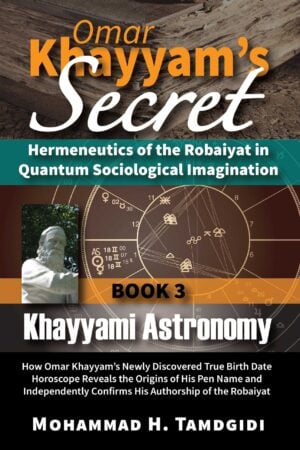Book Section: CHAPTER I — The Persian Text and A New English Translation of Omar Khayyam’s “Treatise on the Science of the Universals of Existence” (Resaleh dar Elm-e Kolliyat-e Vojood) — by Mohammad H. Tamdgidi
$20.00
This essay, titled “The Persian Text and A New English Translation of Omar Khayyam’s Treatise on the Science of the Universals of Existence (Resaleh dar Elm-e Kolliyat-e Vojood)” is the first chapter of the book Khayyami Philosophy: The Ontological Structures of the Robaiyat in Omar Khayyam’s Last Written Keepsake Treatise on the Science of the Universals of Existence, which is the fourth volume of the twelve-book series Omar Khayyam’s Secret: Hermeneutics of the Robaiyat in Quantum Sociological Imagination, authored by Mohammad H. Tamdgidi.
Description
Abstract
This essay, titled “The Persian Text and A New English Translation of Omar Khayyam’s Treatise on the Science of the Universals of Existence (Resaleh dar Elm-e Kolliyat-e Vojood)” is the first chapter of the book Khayyami Philosophy: The Ontological Structures of the Robaiyat in Omar Khayyam’s Last Written Keepsake Treatise on the Science of the Universals of Existence, which is the fourth volume of the twelve-book series Omar Khayyam’s Secret: Hermeneutics of the Robaiyat in Quantum Sociological Imagination, authored by Mohammad H. Tamdgidi.
In this chapter Tamdgidi provides his edition of the Persian text of “Resāleh dar ʿElm-e Kolliyāt-e Vojood” (Treatise on the Science of the Universals of Existence) by Omar Khayyam, followed by his own English translation of the text based on which further hermeneutic analysis will follow in their respective chapters in the rest of this fourth book of the series.
As it will be further explained the issue in later chapters of the book, in Tamdgidi’s view this treatise of Khayyam was invited by and addressed to Moayyed ol-Molk (the younger son of the famous vizier Nezam ol-Molk), not Fakhr ol-Molk (his older brother) as commonly believed, and such an interpretation actually offers significant insights about Khayyam himself, the historical context in which it was written, and the content and purpose of the treatise itself. This means that the treatise was written (or dictated) a few years before than commonly considered, since Moayyed ol-Molk died earlier than Fakhr ol-Molk.
In this treatise, Omar Khayyam offers in a highly condensed and synoptic way his views on the universals of existence, covering a series of topics that culminates in Khayyam’s offering his views on the four major paths of the theologians, philosophers, Ismailis, and Sufis, to knowing God.. Since the treatise presented and translated in this chapter is further analyzed and interpreted in other chapters of this book, this abstract is limited only to the comments below.
Before presenting the above in this chapter, Tamdgidi provides some background to the holdings and reportings of this manuscript in its extant variations based on the information provided by contemporary scholars. Since no punctuation was used in the past when the extant copies of the manuscript were written, as also evident in the original Persian text, he introduces no punctuation of his own to the Persian text. However, to allow for textual analysis, paragraph sections and numbering have been added for easier referencing. He has added Arabic/Persian phonetics where needed for a more accurate reading of the text.
As noted in the introduction, the curved brackets in the main text are used to offer variations found across surviving manuscripts. The square brackets are used to add words that are not in the original but are of his own and can aid the flow of the reading of the text without affecting its intended meaning. In the absence of a definitive manuscript in the original handwriting or dictation of Khayyam, no priority can be assigned to the authenticity of one or another variation indicated in the curved brackets. The variations themselves can therefore provide clues as to what reading of the text may be more expressive and accurate, or whether the variation adds to or takes away from any particular substantive meaning attributed to the text. In most cases, the variations do not make any differences in meaning, but in some cases, the variations do make significant differences, as the author will explain in due course.
Some parts of the text are missing from all extant manuscripts. Some parts exist only in some manuscripts. The texts present in one manuscript but not in another cannot be ignored, however, since there is no reasonable and independent basis for deciding that any manuscript is less or more authentic. A last clause (50) omitted in recent editions has been also added.
Recommended Citation
Tamdgidi, Mohammad H. 2021. “CHAPTER I — The Persian Text and A New English Translation of Omar Khayyam’s “Treatise on the Science of the Universals of Existence” (Resaleh dar Elm-e Kolliyat-e Vojood)” Pp. 17-44 in Omar Khayyam’s Secret: Hermeneutics of the Robaiyat in Quantum Sociological Imagination: Book 4: Khayyami Philosophy: The Ontological Structures of the Robaiyat in Omar Khayyam’s Last Written Keepsake Treatise on the Science of the Universals of Existence. (Human Architecture: Journal of the Sociology of Self-Knowledge: Vol. XVII, 2021. Tayyebeh Series in East-West Research and Translation.) Belmont, MA: Okcir Press.
Where to Purchase Complete Book: The various editions of the volume of which this Book Section is a part can be ordered from the Okcir Store and all major online bookstores worldwide (such as Amazon, Barnes&Noble, Google Play, and others).
Read the Above Publication Online
To read the above publication online, you need to be logged in as an OKCIR Library member with a valid access. In that case just click on the large PDF icon below to access the publication. Make sure you refresh your browser page after logging in.






